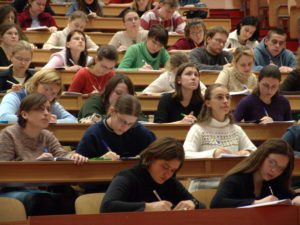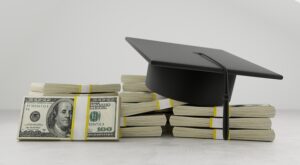 Filing for Bankruptcy for Student Loans
Filing for Bankruptcy for Student Loans
For decades, student loans have left millions of people in serious debt. And over the last few years, the cost has skyrocketed even more. As a Memphis bankruptcy lawyer, I get so many questions every day about bankruptcy and student loans.
Here’s what you need to know.
The High Cost of Student Loans
According to the Federal Reserve, Americans owe $1.78 trillion in federal and private student loan debt. That huge number has an outsized impact on the day-to-day life of so many people.
We hear often about the generations unable to buy a home or even a car, unable to afford children, and too in debt to start a new business. Those are bad enough consequences as it is, and they’ve caused real damage to our economy.
But we rarely hear about the collections efforts if you can’t pay back your loans. The government can be a tough creditor, and they have federal powers that other creditors don’t. If you fall behind on your student loans, the government may:
- Contact your credit bureaus
- Garnish your wages
- Penalize you through the tax system
- Garnish your Social Security payments
- Revoke your professional license, and
- File a lawsuit against you.
You never want to default on student loans (which just means miss your payments). It’s critical you make every payment on time; and fortunately, bankruptcy can help you do that.
 How Chapter 13 Bankruptcy Can Help
How Chapter 13 Bankruptcy Can Help
Chapter 13 bankruptcy works as a repayment plan that consolidates all your debts, including student loans, into manageable monthly payments.
Working with your lawyer and the courts, you design a plan that you can handle with your current income. This provides serious relief by allowing you to catch up on missed payments and avoid the immediate consequences of default.
In addition, Chapter 13 bankruptcy halts the government’s collection efforts. It protects you from wage garnishment or other aggressive creditor tactics.
To find out more about Chapter 13, read our free report on the power of a Chapter 13 bankruptcy.
Using Bankruptcy for Other Debts to Help with Student Loans
Student loans work differently than credit cards or medical bills. You can’t discharge them completely through a bankruptcy. That’s why it’s helpful to add them to a Chapter 13 payment plan.
However, if you have a lot of other types of debt, Chapter 7 bankruptcy can clear that debt for you so you’re better able to pay the student loans.
Chapter 7 bankruptcy helps you get a fresh financial start by eliminating unsecured debts. This includes credit card bills, medical expenses, unsecured personal loans, payday loans, and more.
While your case is ongoing, it stops any collection efforts on your student loans. And usually you won’t accrue interest during that time. So for the right situation, Chapter 7 may offer you some breathing room to focus on your student loans payments.
 A Memphis Bankruptcy Lawyer Ready to Support You
A Memphis Bankruptcy Lawyer Ready to Support You
There are some other things to consider with student loans, including whether you might qualify for undue hardship. This means that you have an unusual circumstance, like a total and permanent disability, that will make it impossible to pay back your student loans.
While a lot of people might look into undue hardship, it’s actually extremely rare. But it’s a good example of how complicated the system is and how many options there might be to help you.
That’s why you’re in over your head with student loans, you should really talk with a bankruptcy attorney about your options. There may be a way forward you haven’t thought of yet.
Our lawyers offer a free consultation, no strings attached. We sit down with you and discuss your situation, and we let you know what solutions might be available.
We’ve helped thousands of people in Memphis get out of debt, and it all starts with that free conversation. So don’t wait to get started. Contact us today to speak with a lawyer about how bankruptcy might help with your student debt.
